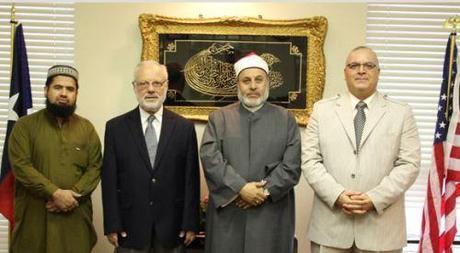
In 2010, in a criminal case of a Muslim man accused of having raped his wife (both man and wife were/are citizens of Morocco residing in the United States), a trial judge in New Jersey actually ruled in favor of the man on the grounds of “his religion” — “the defendant did not act with a criminal intent when he repeatedly insisted upon intercourse, despite plaintiff’s contrary wishes” because the prophet Muhammad had said a wife can never refuse sex to her husband. The judge also vacated the temporary restraints, dismissed the plaintiff’s domestic violence action, and ruled against a final restraining order against the man because he found it “unnecessary” since the two were now divorced.
Thankfully, a panel of three appellate judges in the Superior Court of New Jersey overturned the trial judge’s rulings, as well as ruled that the trial judge had erred in not issuing a final restraining order. (See “S.D. v. M.J.R., Docket No. 6107-08T2” and my post of July 27, 2010, “Sharia Law in New Jersey“.)
In March 2011, in a civil case over who controls the funds of a Muslim mosque, the Islamic Education Center of Tampa, Florida, U.S. circuit court judge Richard J. Nielsen ruled that “the case will proceed under Ecclesiastical Islamic Law,” that is, the disputants must follow Sharia law. (See “Florida Judge Orders Muslims to Follow Sharia Law“)
Now, Sharia law has come to Texas.

Islamic Tribunal of Dallas, Texas
Bob Price reports for Breitbart Texas, Jan. 27, 2015, that an Islamic Tribunal using Sharia law in Texas is operating as a non-profit organization in Dallas. One of the attorneys for the tribunal said participation and acceptance of the tribunal’s decisions are “voluntary.”
One of the Islamic Tribunal’s “judges,” Dr. Taher El-badawi, said the tribunal operates under Sharia law as a form of “non-binding dispute resolution,” but insists their organization is “a tribunal, not arbitration.” Nor do the four Islamic attorneys who work for the Islamic Tribunal call themselves “arbitrators,” but instead “judges.” A tribunal is defined by Meriam-Webster’s Dictionary as “a court or forum of justice,” which makes the so-called Islamic Tribunal in Dallas a COURT.
El-badawi said the tribunal follows Sharia law to:
- Resolve civil disputes in family, business, and “community” matters.
- Resolve workplace disputes.
- Adjudicate in divorce (Talaq): El-badawi said that “while participation in the tribunal is voluntary, a married couple cannot be considered divorced by the Islamic community unless it is granted by the tribunal.” He also said only the husband can request the divorce directly from the tribunal. “The wife must go to an Imam who will request the divorce for her.”
El-badawi said the tribunal follows Texas family law when it comes to child support, visitation, and custody, and that in most cases, custody of children is awarded to the mother.
When asked what happens when there is a conflict between Sharia law and Texas law. El-badawi said most of the time, the laws are in agreement. When pushed further he admitted that, “we follow Sharia law.” However, he explained, “If the parties are not satisfied with the tribunal’s decision, they do not have to accept it and they can take the matter to Texas civil courts.” He did not say what the social ramifications of rejecting the “judge’s” decision would be.
The website for the Islamic Tribunal states, “The courts of the United States of America are costly and consist of ineffective lawyers. Discontent with the legal system leads many Muslims in America to postpone justice in this world and opt for an audience on the Day of Judgment. It is with this issue that Muslims here in America are obligated to find a way to solve conflicts and disputes according to the principles of Islamic Law and its legal heritage of fairness and justice in a manner that is reasonable and cost effective.”
In explaining Sharia law, the website states, “Stoning adulterers, cutting of the hands, polyandry and the like (all can be traced in the relevant literature and can be explained in their Islamic legal mentality and rational context in fairness and justice), are mainly a part of Islamic Criminal Law. In fact criminal law within Islam only makes up a fraction of the Shari’ah. It is unscholarly and unfair to generalize that type of understanding, that is Criminal Law, to compromise the whole of Islamic law if we stick to speaking in technical terms.”
The website lists four “judges”: Imam Yusuf Z.Kavakci, Imam Moujahed Bakhach, Imam Zia ul Haque Sheikh and Dr. El-badawi.
El-badawi restated several times that participation in the tribunal is voluntary. However, he would not discuss what happens to someone who did not follow their rulings.
H/t Clash Daily
See also:
- Obama Says He’s Muslim
- Obama administration succumbs to Islamic Sharia Law
- Sharia Law: The Real War on Women
- News of City of Dearborn going sharia is a hoax
- Sharia Law to be enshrined in British legal system as lawyers get guidelines on drawing up documents according to Islamic rules
- Europe grows a pair – says no to Shariah
~Eowyn

